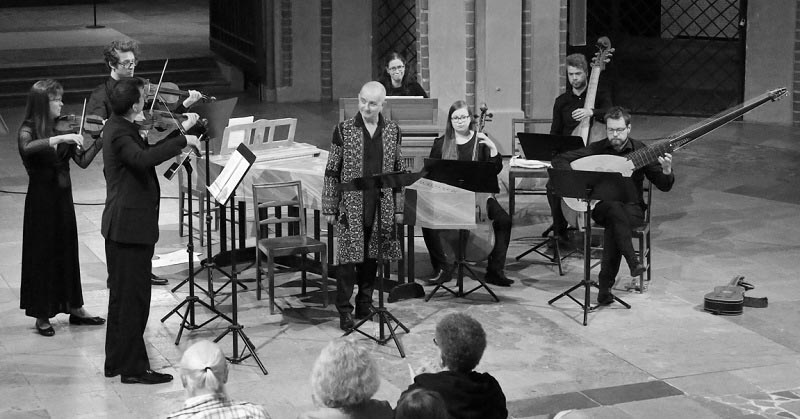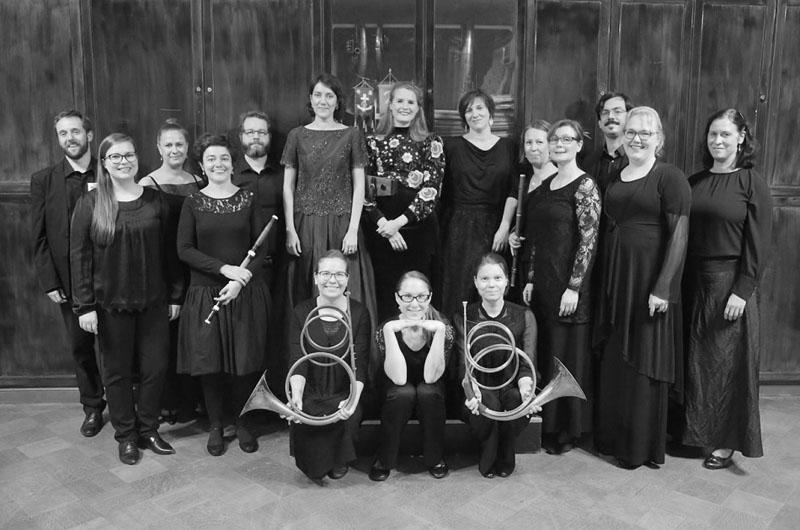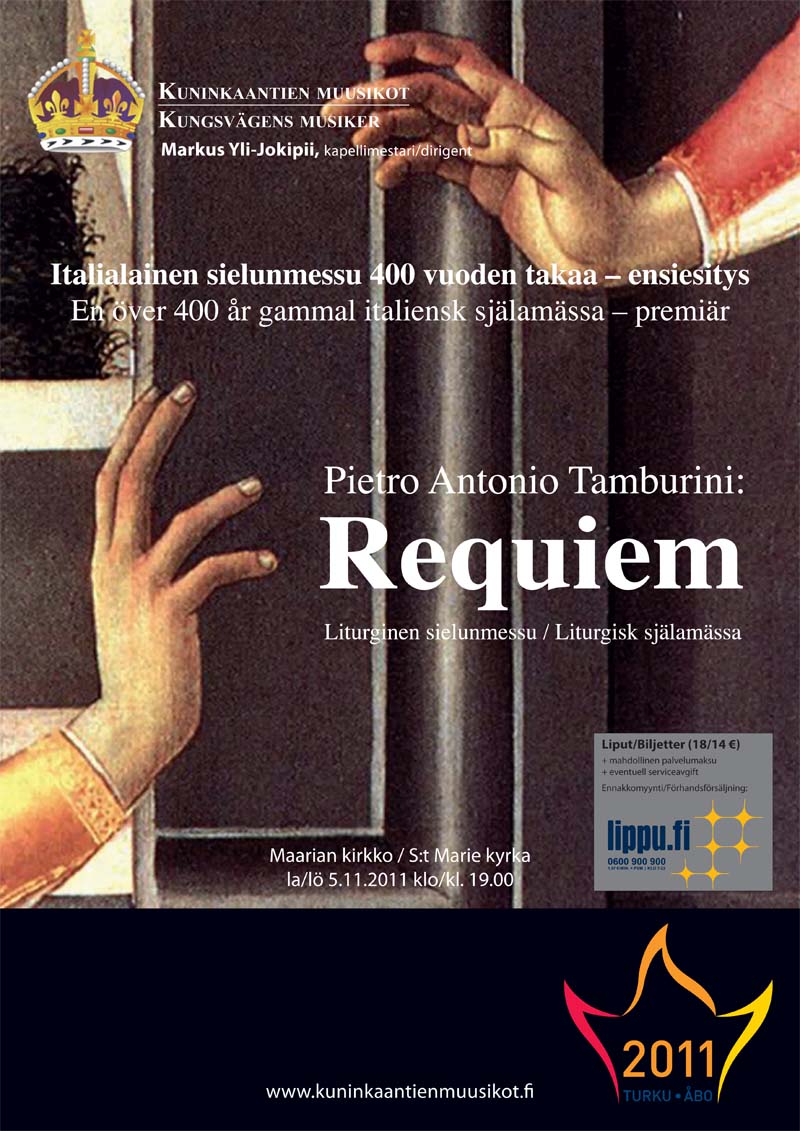Not all orchestras and choirs are the same
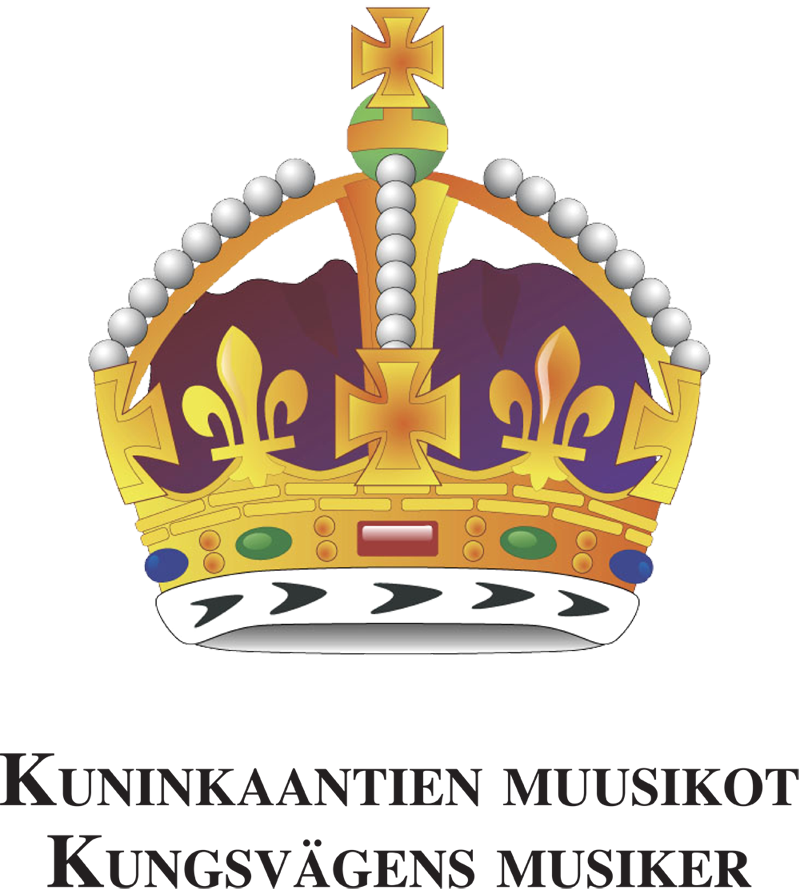
Musicians of the King’s Road is a Finnish baroque orchestra and choir. The ensemble was founded in 2008 and is based in Turku, a city on the southwest coast of Finland. Musicians of the King’s Road has created its own niche in the field of early music in Finland and has become renowned for its distinctive repertoire planning and high-quality concert productions. The main emphasis lies on presenting unknown works by both well-known and unknown composers, principally from the 17th and 18th centuries.
Orchestra and choir
Musicians of the King’s Road is the only Finnish ensemble that comprises both a professional orchestra and a choir. One of the keystones of the repertoire has therefore been performing works written for orchestra, choir and soloists. The orchestra and the choir also perform separately, giving instrumental and a cappella concerts respectively. The size of the ensemble varies depending on the requirements of the works that are performed.
Musicians of the King’s Road has from the very start been a professional ensemble. In addition to professional musicians, it has employed many dancers and other professional artists in its productions. Contacts with musicians and cultural institutions abroad have also been an essential part of the activities. Musicians of the King’s Road has had several guest soloists and conductors from abroad and musicians from over ten different countries have played in the orchestra.
Musical rarities and unique productions
Musicians of the King’s Road has specialised in performing rare works by both well-known and unknown European composers, mainly from the 17th and 18th centuries. A significant part of the repertoire consists of works that have rarely, if ever, appeared on concert programmes in Finland. Dozens of compositions have received their first performances in Finland by Musicians of the King’s Road.
The concerts of the Musicians of the King’s Road are always individually produced, unique entities. Aspects that are taken into consideration when planning concerts are not only the special features of the works that are performed, but also the venues and the occasions of the performances. Meticulous historical research characterizes the productions, and the results of this work are presented to the audience in the comprehensive, bilingual (Finnish and Swedish) concert programme booklets.
Musicians of the King’s Road often collaborates with parishes, local authorities and other cultural actors for its productions. During its first decade, Musicians of the King’s Road has continuously expanded its activities and gained national as well as international visibility. Several of its concerts have been recorded and broadcast by YLE Radio 1.
The historical King’s Road
For centuries, the connection called the King’s Road served as a postal route between Bergen in Norway and St. Petersburg in Russia. It was used also by travelling royals, scholars and artists. The Musicians of the King’s Road is comprised of musicians and singers living along this historical route.
Musicians of the King’s Road has a strong connection to its home region, Southwest Finland, and has for over ten years enriched the cultural life of its hometown Turku with regular early music concerts and other events. Turku Cathedral has been one of its main concert venues through the years. One of the missions of the ensemble is to bring high-quality concert productions also to smaller localities; places, where early music can more seldom be heard performed live.
Conductor Markus Yli-Jokipii was the artistic director of Musicians of the King’s Road from 2009 to 2015. The ensemble has also been conducted by e.g. Jean-Marc Andrieu, Robert King, Michele Vannelli and Flavio Colusso.
Sami Palsio has been chief executive of the ensemble since it was founded, and Maria Hjerpe serves as its associate manager.
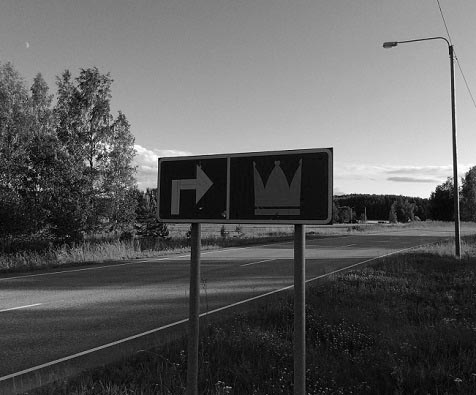
Concert series presenting rare instruments
In 2012, Musicians of the King’s Road initiated a series of concerts that presents rare historical instruments. These are instruments that have virtually disappeared from the concert halls, but for which works were written for example by many composers of the classical period. In the first concert, during the festival of the Night of the Arts, the solo instrument was the glass harmonica, played by William Zeitler. In August 2013, the series continued with the visit of the Italian baroque bassoonist Paolo Tognon in Turku. In the Epiphany concert in 2014, when Musicians of the King’s Road performed the Te Deum by Marc-Antoine Charpentier, the orchestra included a historical serpent. The concert finished with Rondeau from Les Indes galantes by Jean-Philippe Rameau, and in this piece the instrument called Chinese hat was heard probably for the first time ever in Finland.
In August 2014, the founder of the legendary baroque orchestra La Petite Bande, Sigiswald Kuijken, appeared as soloist and conductor with Musicians of the King’s Road. Kuijken played both the violoncello da spalla and the baroque violin in the concert on the Night of the Arts. A year later, the soloist of the Night of the Arts was Eleonora Vulpiani from Italy, playing the seldom-heard instrument lira-chitarra.
The next instrument presented in the series was the tromba marina played by Eberhard Maldfeld from Germany. In the same concert, another rarity, the wooden timpani, could be heard for the first time in Finland. In January 2019, Maija Lampela played as soloist on the so-called violin for women, pardessus de viole, and in October the same year Marieke Van Ransbeeck from Belgium appeared in the series on musette de cour, French baroque bagpipe.
Significant productions
Historical performance of a 400-year-old St Matthew Passion in Turku
In spring 2013, Musicians of the King’s Road performed the 400-year-old St Matthew Passion written by the German composer Melchior Vulpius. According to historical sources, this was the very first polyphonic passion composition that had ever been performed in Finland, in Turku Cathedral at the end of the 17th century. The performances were given within a liturgical context in four churches in Southwest Finland, all receiving remarkably large attendance.
On Good Friday 2014, the passion was performed in the Taulumäki Church in Jyväskylä. The performance received a huge success and a record audience of 600 listeners. A year later, on Palm Sunday 2015, the passion returned to the Vasa region in western Finland after an interval of some 300 years. The passion was performed in the church of Vähäkyrö, in a service that was attended by almost 800 people.
Later on, Musicians of the King’s Road has continued the passion cycle by performing historical passion settings by Antoine de Longueval, Jakob Meiland, Johann Walter, Christoph Demantius and Bartholomäus Gesius. The performances were conducted by Jonas Rannila and they were included in the Reformation anniversary celebration programme.
Musicians of the King’s Road played for the Swedish Royal Couple
Musicians of the King’s Road performed a programme with music from the 18th century Royal Court of Sweden at a private event that was held in Turku Castle in early September 2012. The programme consisted of music written by Francesco Uttini. None of the compositions had been performed in Finland before. The event that gathered participants from more than 20 countries was held in the presence of the King of Sweden Carl XVI Gustaf and Queen Silvia.
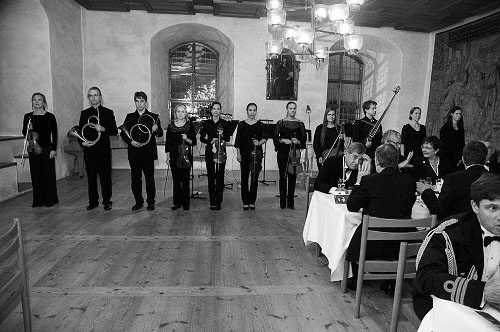
Musicians of the King’s Road in the Capella Hall of St. Petersburg
Musicians of the King’s Road, baroque orchestra, choir and soloists, gave a concert in the sold-out Hall of the State Academic Capella of St. Petersburg on 29 October 2011. The St. Petersburg Capella is one of the most legendary venues in Russia, and it has been considered the face of the musical life in the country. The history of the Capella goes back as far as to the 14th century. Several famous and important composers and conductors have worked with the Capella, such as Glinka, Paisiello, Cimarosa, and Rimsky-Korsakov.
Musicians of the King’s Road was the first-ever Finnish ensemble to perform in the Cappella Hall.
Turku Night of the Arts festival
Since 2016, Musicians of the King’s Road is responsible for coordinating the official programme of the Night of the Arts festival in Turku. The event celebrated its 30th anniversary in 2019 and is the oldest cultural event in Turku with an uninterrupted history.
The unknown composer – Pietro Antonio Tamburini
In September 2009, Sami Palsio, chief executive of Musicians of the King’s road, heard that somewhere in an archive in Europe one would find a handwritten copy of a requiem that had been composed in the 17th century by a so far unknown composer. As far as was known, this mass had never been performed, let alone published, and all that remained was the handwritten copy of it.
The composition was tracked through Europe and was a few weeks later localised in one of the most important old musical centres of northern Italy.
In October, Palsio contacted an Italian company specialized in copying old manuscripts and asked them to copy the whole handwritten material. The microfilm arrived in Finland a few weeks later and the mass that had been hidden in the archives for almost four centuries was thereby disinterred. Already at this point was there a feeling that through this discovery the unknown composer would experience a renaissance – and this process was to commence in Turku in Finland.
The mass was performed in Maarian kirkko in Turku on All Saints’ Day, 5 November 2011.
Musicians of the King’s Road was awarded a grant from the Pro Musica Foundation on June 7, 2012.
Musicians of the King’s Road was chosen the regionally most significant cultural project in 2010 by the Finnish Cultural Foundation, Varsinais-Suomi regional fund.
Turku 2011 Foundation granted Musicians of the King’s Road the Teko 2011 Honourable Mention on Europe Day, May 9, 2009.

